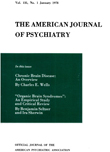The Psychotherapy of Schizophrenia: Does It Work?
Abstract
Empirical studies of the treatment of schizophrenia show the unequivocal ameliorative effects of psychoactive drugs. No comparable effects have been claimed for psychotherapy. As a result, psychotherapy has tended to be negated as a viable therapeutic factor in the treatment of schizophrenia. Yet the sophisticated drug evaluation studies are not matched by sophisticated assessments of psychotherapy. Serious methodological errors exist in the latter studies; there have been inappropriate outcome criteria, inadequate assessment procedures to measure change, unsound selection of therapists, and unclear diagnostic appraisals. The issue has been further clouded by the heterogeneous nature of psychotherapeutic interventions, comprising as they do—in contrast to the relatively simple administration of drugs—a congeries of methods, techniques, and goals. This paper examines some of the requirements for appropriate evaluation studies of psychotherapy of schizophrenic patients.
Access content
To read the fulltext, please use one of the options below to sign in or purchase access.- Personal login
- Institutional Login
- Sign in via OpenAthens
- Register for access
-
Please login/register if you wish to pair your device and check access availability.
Not a subscriber?
PsychiatryOnline subscription options offer access to the DSM-5 library, books, journals, CME, and patient resources. This all-in-one virtual library provides psychiatrists and mental health professionals with key resources for diagnosis, treatment, research, and professional development.
Need more help? PsychiatryOnline Customer Service may be reached by emailing [email protected] or by calling 800-368-5777 (in the U.S.) or 703-907-7322 (outside the U.S.).



